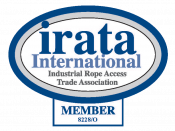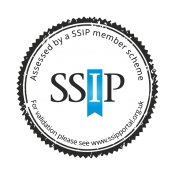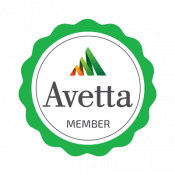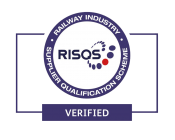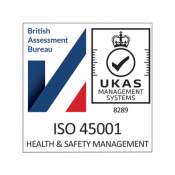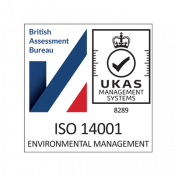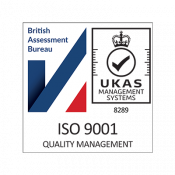Rope Access Training
Courses for all IRATA levels
IRATA ROPE ACCESS TRAINING, IN A BEAUTIFUL GRADE A LISTED CHURCH
Our state of the art IRATA rope access training facility is housed in a magnificent Grade A listed church in Penicuik near Edinburgh, Scotland. You’ll be trained by the best in the industry, providing the highest calibre of rope access training from a uniquely interesting and exceptional training venue.
To book a course, please click the ‘Book’ button below.
BOOKING A COURSE
Please click on the link above to book a course. We have courses running most weeks and if we are full, you can always add your name to the waiting list (… last minute cancellations do happen!) If you have any queries or problems that the information on the website can’t answer, please don’t hesitate to get in touch.
Call 0131 553 3268 or email training@sgaccess.co.uk
WHAT IS ROPE ACCESS?
Rope access is a safe method of working at height where ropes and associated equipment are used to gain access to and from the work position and to be supported there. Rope access technicians use these methods to work in a wide range of industries, such as offshore oil and gas, power and petrochemical, renewable energy, confined spaces, natural and built environments, and more.
IRATA LEVEL 1
Starter course for trainee technicians. They will be able to perform a specified range of rope access tasks under the supervision of a Level 3 technician.
IRATA LEVEL 2
An experienced rope access technician who has Level 1 skills plus more complex rigging, rescue, and rope access skills, under the supervision of a Level 3.
IRATA LEVEL 3
A technician who is capable of complete responsibility for rope access safety in work projects; can demonstrate the skills & knowledge required of Levels 1 and 2; is conversant with relevant work techniques and legislation; has an extensive knowledge of advanced rigging and rescue techniques; holds an appropriate and current first aid certificate, and has knowledge of the IRATA International certification scheme.
EXPERIENCE THE SG DIFFERENCE
Our beautiful facility offers something to trainees that we believe is quite special, and on completion of their training, rope access technicians of all levels can further benefit from help and guidance from the excellent operational arm of SG. Whether you’re considering rope access as a new job prospect, or following the next stage in your rope access career, step off on the right foot – come and train with us at the church of rope access, and experience the SG difference for yourself.
Book Training
Please use the ‘Book’ button at the top of the page to book your courses.
We look forward to welcoming you to ;
#gibbonschool @ #thechurchofropeaccess
Penicuik South Kirk, Peebles Road, Edinburgh, EH26 8LX, Scotland
Further information & pre-requisites for training;
PARKING @ THE CHURCH
On street parking is available on Bridge Street just metres away from the church.
Please avoid parking on the single lane side road (Alderbank) and the carpark at the end of this. This car park is for the local park walk.
ATTITUDE & AGE
To ensure a safe work environment, candidates must have an appropriate attitude alongside fitness and physical capabilities. An appraisal can be arranged with a SG Access if unsure. Rope access work is often remote and far from outside help, meaning a respect for heights and responsible behaviour is required to prevent any incidents. SG Access has the right to exclude any candidate from training if they have concerns over their fitness or attitude. Candidates also need to be at least 18 years of age
MEDICAL
Candidates need to be physically fit and unaffected by any disability/medical condition which prevents them from working safely and are required to certify that they do not have any medical disabilities, by a self-certification. It is recommended that any condition has a medical certificate or doctors note to show potential employers that it won’t affect their work at height. Any long-term condition should be re-assessed medically to ensure appropriate medical condition. Should you have any queries regarding your medical condition and how it may impact your IRATA training please contact the SG Training office for more advice.
UPGRADES
Candidates applying for an upgrade course should be competent in all practical as well as theoretical requirements for their current level and should be capable of performing all techniques and answering questions at that level.
Those deemed not competent to their existing level may require additional training.
Candidates should consider their experience carefully before attempting to progress to a higher level. Candidates without appropriate competence, adequate pre-assessment training and knowledge of the syllabus are unlikely to meet the requirements.
Candidates looking to take an upgrade need to ensure that their certificate is valid on the day of assessment and that they also have at least one years’ experience alongside 1000 working hours signed off correctly in their logbook.
Technicians should present their logbook to the SG Access at the beginning of the course for re-validations or upgrades. Lost logbooks can be replaced by IRATA.
TRAINING COURSE AND ASSESSMENT
Training courses take a minimum of 30 hours over 4 days followed by a one-day assessment; however, training length may vary between training centres. There may be a gap between training and assessment (this can be no longer than 60 days). During training candidates shall be taught all Level 1 topics in preparation for their assessment.
The assessment will be carried out by an IRATA International Assessor and is in two parts: written and practical. Level 1 candidates are required to answer theory questions as well as being able to demonstrate their competency in all Level 1 syllabus tasks. The Assessor will grade the candidate to ensure they carry out all tasks in a safe manner in accordance with the requirements of the certification scheme.
Should the candidate fail the assessment they have 60 days to retake from the date of the failed assessment before they will have to retake the training course in full. Candidates shall provide a copy of their previous assessment form at the time of reassessment. Candidates unable to provide a copy of their previous assessment form are required to attend a training course in full before re-assessment.
IRATA CERTIFICATION
IRATA certification shall be granted once all certification requirements are fulfilled. Undertaking the assessment is one part of the certification process. Successful completion of training or passing the assessment does not in itself guarantee that all certification requirements have been met. Certification will only be granted by IRATA upon verification that all prerequisites and all relevant parts of the certification process have been successfully fulfilled.
Successful technicians shall receive a certificate of competence, a photo identification card (ID card) and IRATA Logbook upon initial registration, stating the level and type of certificate awarded and the expiry date.
Following approval by IRATA, the Technician can practise as an IRATA level 1 for a period of three years. Technicians may progress annually to Level 2 & 3 on the accrual of the pre-requisite 1000 on-rope working hours at each level.
REVALIDATION
IRATA Technicians are required to take re-validation training and assessment every three years to ensure that they remain current and maintain safe working practices. Rope access Technicians not engaged in rope access work for 180 days or more shall attend refresher training.
Back to the top of the page
Please use the ‘Book’ link at the top of the page to book your courses.

